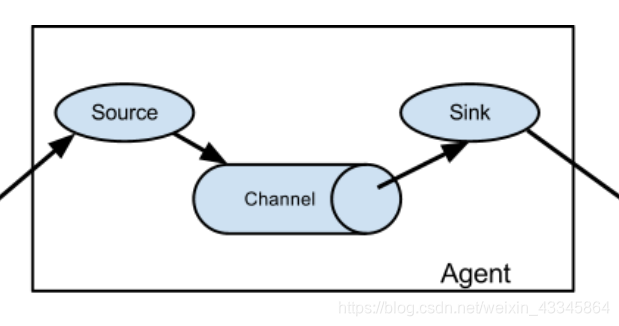flume實現監控埠和檔案教程
阿新 • • 發佈:2018-12-15
要實現flume的監控首先要了解flume的執行原理

如上圖它有一個管道channel前面的source就是要監控的檔案或埠,而sink 則是監控到的資料傳輸的位置。
而且flume的傳輸單位是一Event為單位,以事件形式將資料從源頭傳送到目標位置。
下面來說一下具體實現方法
解壓然後修改配置檔案
修改flume-env.sh裡的Java路徑
export JAVA_HOME = /home/hadoop/install/jdk1.8.0_152
安裝 監控埠工具
yum install telnet
建立監控的配置檔案flume-telnet.conf新增
# Name the components on this agent a1.sources = r1 a1.sinks = k1 a1.channels = c1 # Describe/configure the source a1.sources.r1.type = netcat a1.sources.r1.bind = localhost a1.sources.r1.port = 44444 # Describe the sink a1.sinks.k1.type = logger # Use a channel which buffers events in memory a1.channels.c1.type = memory a1.channels.c1.capacity = 1000 a1.channels.c1.transactionCapacity = 100 # Bind the source and sink to the channel a1.sources.r1.channels = c1 a1.sinks.k1.channel = c1
判斷埠是否被佔用
netstat -tunlp | grep 44444
在flume安裝路徑下監控輸出埠
bin/flume-ng a1--conf conf/ --name a1 --conf-file conf/flume-telnet.conf -Dflume.root.logger==INFO,console
再開一個終端控制檯執行
telnet localhost 44444
在此控制檯輸入一些字元,點回車提交輸入,看監控的控制檯是否有相同字元列印。
如果輸入內容錯誤,可以按住Ctrl鍵同時點刪除。
監控檔案
建立配置檔案在flume-file.conf新增
a1.sources = s1 a1.channels = c1 a1.sinks = k1 a1.sources.s1.type=exec a1.sources.s1.command=tail -F /tmp/logs/kafka.log a1.sources.s1.channels=c1 a1.channels.c1.type=memory a1.channels.c1.capacity=10000 a1.channels.c1.transactionCapacity=100 # Describe the sink a1.sinks.k1.type = logger # Use a channel which buffers events in memory a1.channels.c1.type = memory a1.channels.c1.capacity = 1000 a1.channels.c1.transactionCapacity = 100 # Bind the source and sink to the channel a1.sources.s1.channels = c1 a1.sinks.k1.channel = c1
在flume安裝路徑下監控輸出埠
bin/flume-ng agent --conf conf/ --name a1 --conf-file conf/flume-file.conf -Dflume.root.logger==INFO,console
再開一個終端多次輸入類似下面的語句
echo "aaa" >> /tmp/logs/kafka.log
看監控輸出埠的控制檯變化。
注意:
監控埠格式是netcat,監控檔案是exec,監控資料夾的格式是spooldir
flume的source 與sink對接格式為avro
